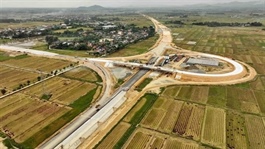Vietnamese economy forecast to grow by over 6 per cent in 2024
Vietnamese economy forecast to grow by over 6 per cent in 2024
Vietnam's economy continues to gain momentum and is forecast to grow by more than 6 per cent in 2024, its positive outlook led by the recovery of export demand and strong inflows of foreign investment.

This is according to the preliminary assessment published by the ASEAN+3 Macroeconomic Research Office (AMRO) on October 9 after its annual consultation visit to Vietnam last month.
"The Vietnamese economy is forecast to grow by 6.2 per cent in 2024 before rising to 6.6 per cent in 2025," said AMRO's lead economist Sumio Ishikawa. "However, the uneven economic recovery calls for a recalibration of the macroeconomic policy mix to promote a more broad-based recovery, while safeguarding financial stability."
Despite the temporary economic disruption caused by Typhoon Yagi, the outlook for Vietnam is improving in the near term due to resilient demand for export orders. Although food prices are expected to rise in the coming months as a result of disruption to agricultural production, inflationary pressure remains contained, owing to weak domestic demand, the recent decline in global oil prices, a tightening in liquidity condition, and the appreciation of the VND. Headline inflation is projected to rise from 3.3 per cent in 2023 to 4.1 per cent in 2024, remaining below the State Bank of Vietnam’s target ceiling of 4.5 per cent.
The rebound in exports contributed to the current account surplus, while resilient foreign investment continued to bolster the financial account. However, large net errors and omissions, partly due to unrecorded transactions such as the purchase of virtual assets overseas, have resulted in a deficit in the balance of payments and a decline in international reserves this year. As of the latest data, foreign reserves stood at $83.3 billion in July 2024, equivalent to 2.5 times of short-term external debt.
According to AMRO, Vietnam’s ample fiscal space continues to allow the government to provide targeted support to vulnerable segments of the economy, while expediting the disbursement of the budget for public investment. Nevertheless, revenue collection can be improved by broadening tax base and enhancing compliance of tax laws. To expedite infrastructure development, lack of consistency and clarity in the laws pertaining to public investment, which lead to slow disbursement, should be addressed.
To the extent that inflation is well anchored and has been brought under control, the monetary stance can remain accommodative to support more broad-based recovery. Monetary policy reform should adopt a more market-based interest rate approach, while further enhancing exchange rate flexibility as a buffer against external shocks, to deepen financial market developments in tandem with rapid economic growth.
The soundness of the banking system should be enhanced by increasing the capital buffers of commercial banks, improving the process of bad debt recovery, and strengthening the bank resolution framework to complement the amended credit institution laws,
"To contain financial risks arising from the real estate sector, macroprudential measures such as loan-to-value ratio, debt service to income ratio, and credit concentration limits should be considered," AMRO noted, before adding "Commercial banks should continue improving corporate governance and risk management. With new real estate laws having come into effect in August, subordinate regulations should be rolled out in a timely manner to boost housing market activities."























